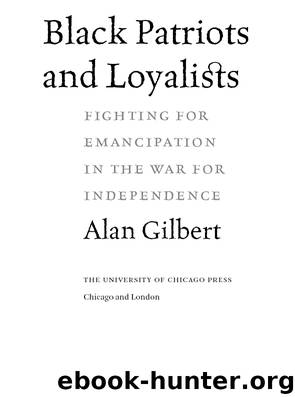Black Patriots and Loyalists: Fighting for Emancipation in the War for Independence by Alan Gilbert

Author:Alan Gilbert
Language: eng
Format: epub
Publisher: University of Chicago Press
Published: 2012-10-08T16:00:00+00:00
chapter 8
Postwar Black Emigrations
The Search for Freedom and Self-Government
The poor people I have brought with me from America begin to feel the sweets of a free government, and I am convinced they would follow the government of France should they be disturbed in their endeavours to maintain their newly acquired freedom.
—John Clarkson, writing to the Marquis de Lafayette, July 2, 1792
The story of the freed former slaves and free blacks who fled the new United States after the British defeat is the story of a continued search for freedom and of ongoing struggles to continue and to expand the second revolution in the wake of the first. From Canada to the Caribbean and from the New World to Africa, freed slaves sought to fulfill the promise of their original efforts to achieve liberty and equality. Unhappily, what they often encountered instead was misery, exploitation, and racist violence.
Nevertheless, after the American Revolution, among émigrés from the newly independent former colonies, the second revolution, the revolution for black freedom, took on a new dimension. It became part of an international revolution devoted to incipient stirrings of democracy around the world as well as to freedom from slavery. In Canada, for example, Thomas Peters, an ex-slave and a giant figure, strove relentlessly to win democracy and subsistence for himself and others there.
Peters would eventually lead some twelve hundred free blacks to emigrate from Nova Scotia to Sierra Leone. There, in the face of repeated setbacks, Peters and other radical democrats, such as Isaac Anderson, forged a novel democratic regime. In Canada, Sierra Leone, Jamaica, and elsewhere in the British Empire, the ideas of the American Revolution, combined with imperial emancipation and the promptings of Christianity, spread the aspirations of former slaves not only to be free but also to govern themselves.
IMMIGRATION TO NOVA SCOTIA
After the Revolution, many blacks found freedom and even the American idea of natural rights by immigrating to Canada with the Crown. How many did so has been in question. Some historians cite four thousand free blacks as the number who escaped to Nova Scotia. This total includes the three thousand listed in the Book of Negroes. By such an estimate, however, three blacks would have come on the ships from New York with Sir Guy Carleton for every one who immigrated separately. Nonetheless, in the Book of Negroes, only some twenty-six hundred were free.1 Had they examined the logs of ships listed in the Book, these scholars should have estimated that a total of thirty-six hundred free blacks arrived in Nova Scotia.
Still, a simple way exists to figure out how many free blacks escaped to Canada through New York earlier or subsequently on ships from the South. One can compare the musters of black settlers at Annapolis and Birchtown in Nova Scotia with the Book of Negroes. For Annapolis in 1784, 78 heads of household came separately from Carleton’s fleet. In contrast, only 29 emigrated with it, a ratio of roughly 2⅔ to 1. Including entire families, 163 persons escaped to Annapolis by means other than Carleton’s ships.
Download
This site does not store any files on its server. We only index and link to content provided by other sites. Please contact the content providers to delete copyright contents if any and email us, we'll remove relevant links or contents immediately.
| Africa | Americas |
| Arctic & Antarctica | Asia |
| Australia & Oceania | Europe |
| Middle East | Russia |
| United States | World |
| Ancient Civilizations | Military |
| Historical Study & Educational Resources |
Goodbye Paradise(3800)
Men at Arms by Terry Pratchett(2832)
Tobruk by Peter Fitzsimons(2508)
Borders by unknow(2303)
Arabs by Eugene Rogan(2292)
Pirate Alley by Terry McKnight(2218)
More Than Words (Sweet Lady Kisses) by Helen West(1860)
Belonging by Unknown(1854)
It's Our Turn to Eat by Michela Wrong(1727)
The Biafra Story by Frederick Forsyth(1653)
The Source by James A. Michener(1603)
Botswana--Culture Smart! by Michael Main(1598)
Coffee: From Bean to Barista by Robert W. Thurston(1542)
A Winter in Arabia by Freya Stark(1534)
Gandhi by Ramachandra Guha(1528)
The Falls by Unknown(1520)
Livingstone by Tim Jeal(1482)
The Shield and The Sword by Ernle Bradford(1403)
Africa: Altered States, Ordinary Miracles by Richard Dowden(1382)
